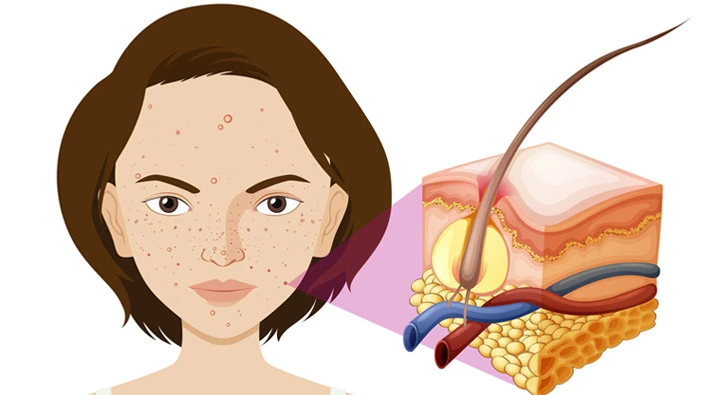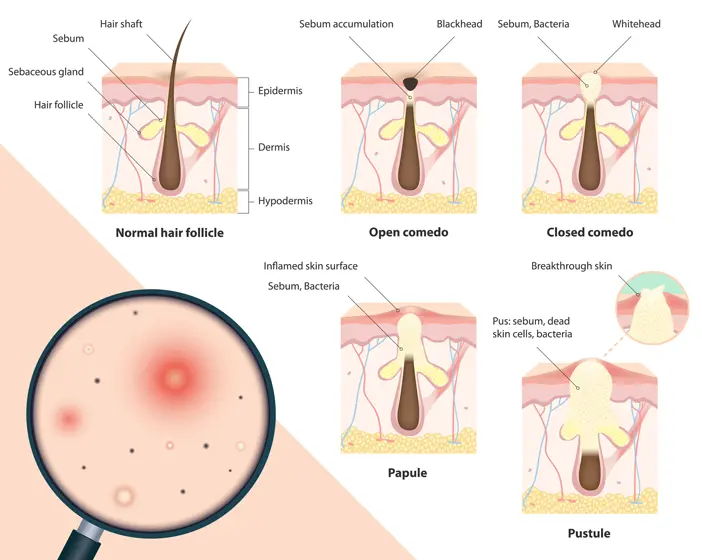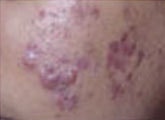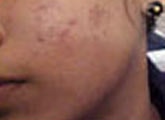Acne treatment
Pimple, known medically as Acne Vulgaris, is a skin disease characterized by tiny bumps and pustular lesions on the surface and beneath the skin.
Acne (Pimples) is the most common skin condition among adolescents and young adults in India and affects a whopping 85% of teenagers. Nearly half of them suffer from acne severe enough to experience physical and psychosocial morbidity. Therefore, they need systematic and rational Acne treatment.

Acne or Pimples usually comes about in the early stages of puberty. It is often mild and tends not to last far beyond adolescence. But this skin ailment can occur at any time in life.
In some cases, acne can last years beyond puberty. While untreated acne lasts around five years before dissipating, many Indians battle this skin condition well into their fifties.
Is acne permanent?
In the majority of cases, acne is not permanent and does not have any serious health concerns. However, untreated acne can result in permanent consequences, including scarring. It can cause distress for the sufferer; hence it is vital to seek treatment and follow preventive care to avoid further damage.
What causes Acne breakouts?
It is a skin manifestation resulting from fluctuating hormone levels and other disturbances of the skin’s oil glands (sebaceous glands) and hair follicles. It causes lesions on your face, neck, back, chest, and shoulders.
Your skin has tiny holes (pores) connected to the oil glands lying under the skin through hair follicles. When these glands produce too much sebum, an oily substance, the pathway gets clogged.
When the excess sebum combines with dead skin cells and debris, they become sticky and trap Propionibacterium acnes (P. acnes) bacteria; it results in inflammation and causes the outburst of acne on your skin. Acne occurs more around puberty or at the time of hormonal changes because there is excess secretion of oil.
At times significant hormonal abnormalities can happen, as in the case of Polycystic ovarian syndrome (PCOS). Sometimes acne is induced by steroid creams, oil application, comedogenic cosmetic creams etc.
Types of Acne
While you can self-diagnose mild acne, a dermatologist’s help is required to identify the severity of the acne outbreak. When you schedule a consultation with our doctors at any of our clinics in Kerala or Tamilnadu, they will perform a physical examination, determine any underlying causes and assess the grade of acne.

Acne is generally divided into two types. Non-inflammatory and Inflammatory.
Non-inflammatory refers to pores that have been blocked with oil, whiteheads, and blackheads. Whiteheads are closed plugged pores.
Inflammatory acne refers to pores that are clogged and infected with bacteria. It then turns into papules that do not contain pus. It may as well turn into pustules (pimples with pus) or cysts. In these cases, the skin surrounding these outbreaks gets red, swollen and can become painful.
Red, tender bumps are known as papules. Bumps that contain pus at the tip is known as pustules. Large and painful lumps under the surface of the skin are known as nodules. Painful and pus-filled lumps under the surface of the skin are called cystic lesions.
Acne Treatment
Our doctors can help you treat your acne with medications that reduce oil production, fight bacterial infection and reduce inflammation.

The treatment of acne depends on the severity and extent of the problem. Our doctors classify the skin condition while diagnosing acne. At the primary stages, if diagnosed rightly, acne can be managed and treated quickly with medications.
Acne is primarily managed using medicines such as creams, lotions or tablets. But now, other options like chemical peeling, I/L injection, light-based therapies, comedone extractions are also available.
The results will be better when both modalities are combined. Regular treatment with follow-up is necessary for a better outcome.
Acne scar treatment
The treatment of acne scars involves various procedures aimed at making the affected skin even. This process and the follow-ups or sittings for treatment depends highly on the size, shape, depth, and nature of the scars.
We combine various modalities to give the patient the maximum possible improvement. We treat superficial scars with peels, microdermabrasion, punch elevation, punch grafting, micro-needling and subcision.
For deeper scars, we recommend laser treatments to improve the outcome. Pulsed dye laser and fractional laser treatment done monthly yield excellent results and make you look more bright and glowing. Apart from the laser treatment, Microneedle RF and RF subcision treatments are also available for treating scars. The treatment is apt on all skin types without any significant adverse effects.


How to prevent ACNE from reappearing?
Acne often is a result of a variety of lifestyle habits. Hereditary & environmental factors do exert a significant effect on the skin.
While we do not yet know what causes acne, researchers believe certain medical conditions can trigger an acne flare-up. So you may need to change your lifestyle to prevent acne from reappearing.
Make sure you sleep for 8 hours, eat moderately, and drink plenty of water in a day. Also, keep your face clean and wash it at least twice a day with mild cleansing bars, so that excess oil is removed from your skin from time to time. It is crucial to have regular follow-ups with your treating doctor, and please do not self-medicate.
